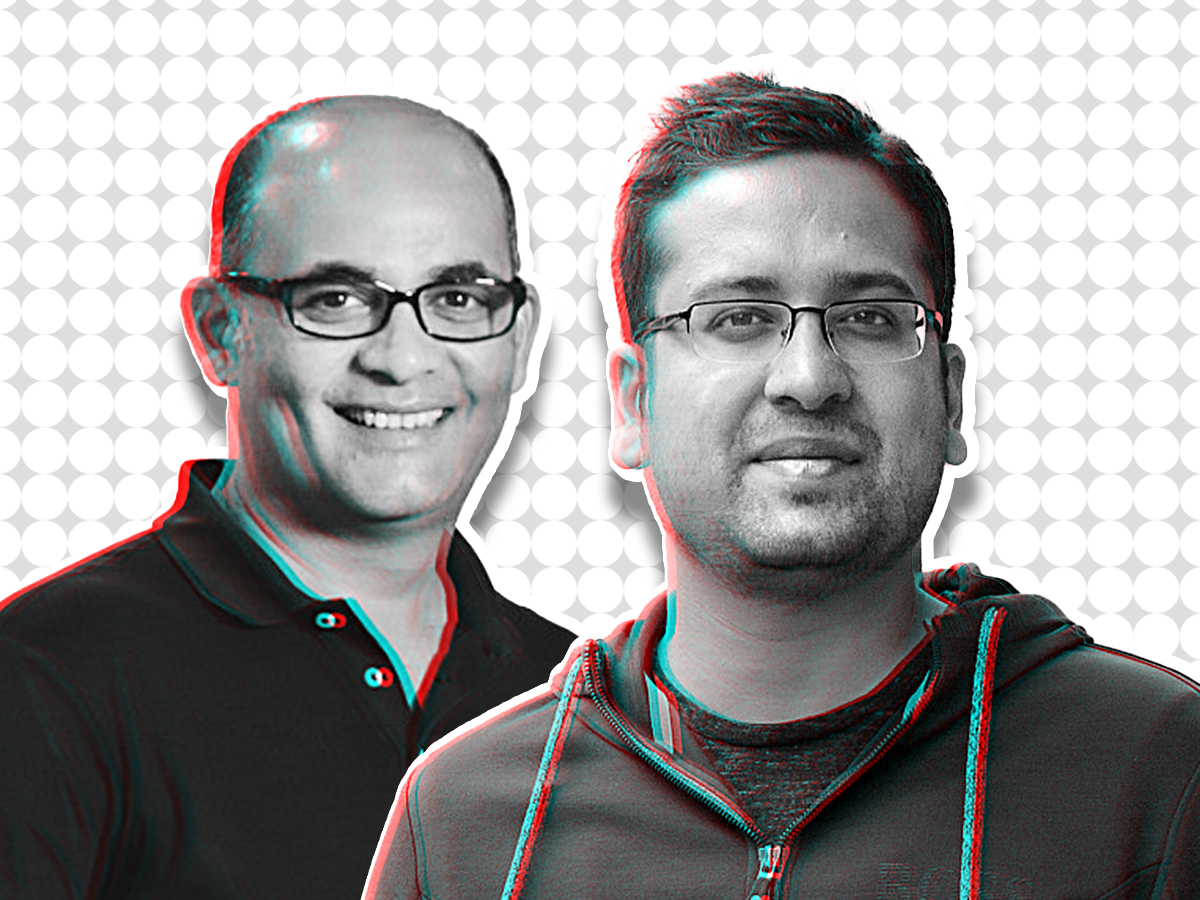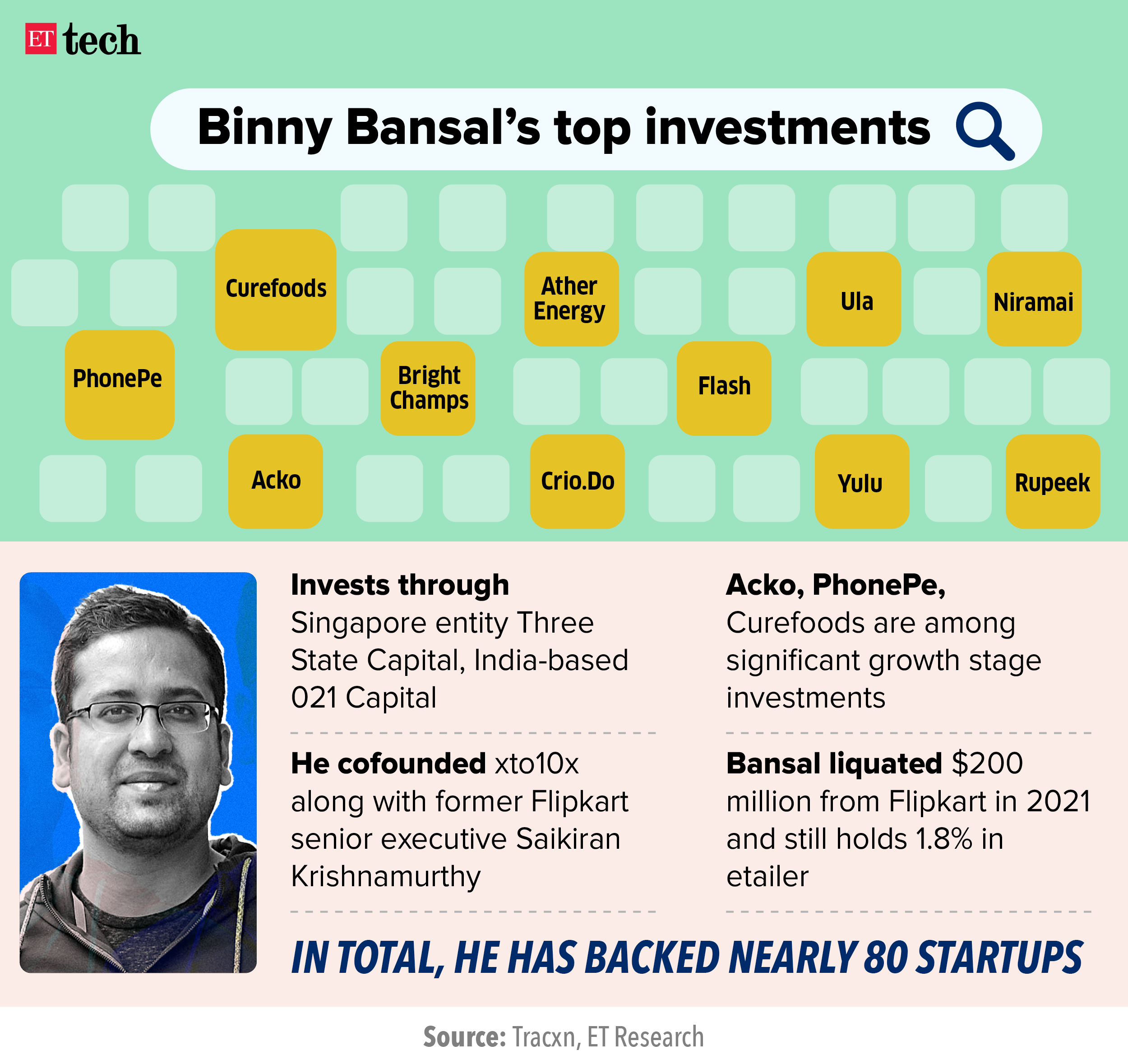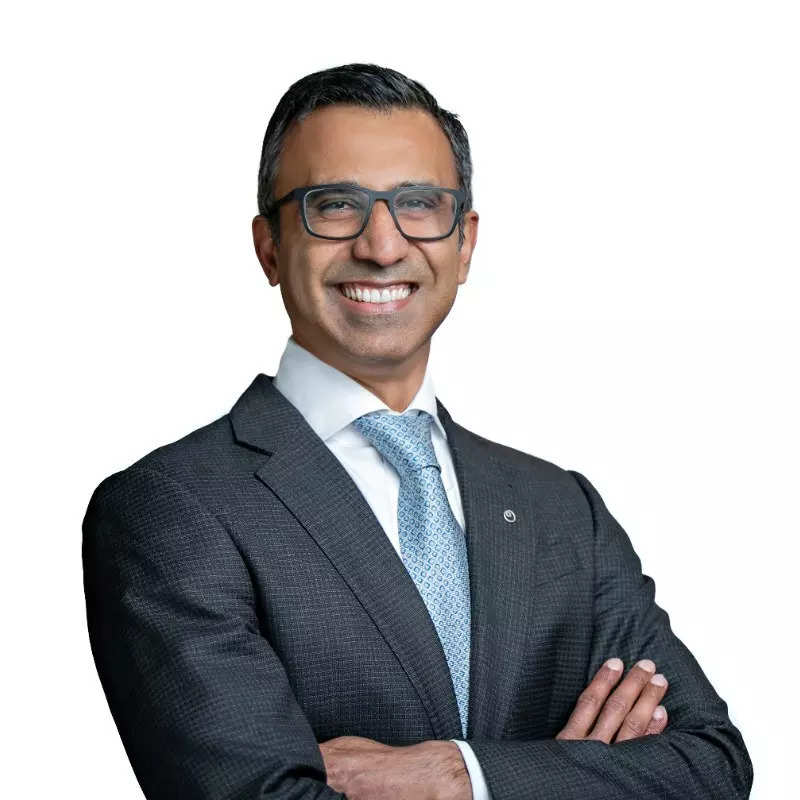AM Scoop: Binny Bansal eyes $100 -150 million stake in PhonePe; draft Digital India Bill to be ready by July
This and more in today’s edition of ETtech Morning Dispatch.
Also in this letter:
■ New column alert: Introducing Full Stack by Samidha Sharma
■ Telcos mull deploying AI to check pesky calls
■ Finance ministry brings crypto under Prevention of Money Laundering Act
Scoop: Flipkart founder Binny Bansal in talks to invest $100 million in PhonePe

(L to R) Sameer Nigam, CEO, PhonePe, and Binny Bansal, cofounder, Flipkart
Flipkart cofounder Binny Bansal may invest as much as $100-150 million in PhonePe, as part of an ongoing financing round at the digital payments company, according to multiple people in the know of the development.
Big deal: Once the transaction goes through, it will be among the largest individual investments in a new-age firm, similar to the $100 million bet taken by Flipkart’s other founder Sachin Bansal in mobility platform Ola during 2018. Typically entrepreneur angel investors back startups at the early stages unlike both the Flipkart founders who have been able to write large cheques especially after their exit from the web retailer almost five years ago.

Funding Curefoods: Bansal is also doubling down on Curefoods, a cloud kitchen platform, which was hived off from Cultfit, founded by Mukesh Bansal and Ankit Nagori in 2016. He has bought secondary shares held by Cultfit in Curefoods, said three people familiar with the deal talks. Sources said Bansal’s ownership has risen from under 5% in Curefoods to around 12-13% with the $25-30 million investment. His other large investment is in new-age insurance firm Acko where he holds about 8-9% stake and first invested in 2018.
Investment vehicles: The entrepreneur-turned- investor has routed his bets through different entities such as the Singapore-based Three State Capital; 021 Capital– a fund founded by Bansal’s financial advisor Sailesh Tulshan where he is the largest sponsor; as well as xto10x Technologies, which he founded along with former Flipkart senior executive Saikiran Krishnamurthy.
Digital India Bill draft post consultation to be ready by July

The draft Digital India Bill, central government’s effort to replace the two decades old IT Act, 2000, will be ready by July, according to sources.
First consultation: The first consultation meeting on the Bill was held in Bengaluru on Thursday. It was attended by as many as 300 stakeholders, of whom more than 200 attended virtually. The stakeholders consisted of law firms, technology companies, technology policy groups and consumers.
What’s the Bill? The minister of state for electronics and IT, Rajeev Chandrasekhar, explained that the Bill intends to effectively manage the intricate aspects of the internet and the fast-paced expansion of various intermediaries. Additionally, it seeks to protect the rights of citizens, tackle emerging technologies and associated risks, and remain adaptable to future advancements.
Safe harbour: The IT Act protects certain intermediaries from prosecution under Section 79. The minister told ET, that the government intends to have one or two categories of intermediaries which can be offered safe harbour provision, while other platforms, like e-commerce, fact-checking, online gaming, which will have rules for each category.
New column alert: Introducing Full Stack by Samidha Sharma

Hi, Samidha here in Mumbai. Today, I am launching a new column– Full Stack– to chronicle my commentary on the tech and startup world and the cast of characters which inhabit it.
Coming from my vantage point- this will be an unfiltered view of the world which I have covered for more than a decade. Don’t worry this won’t be like another hot take, and we won’t flood you with mails. I will write only when I find something interesting to say.
First edition: Today, I write about how founders, investors, and all other participants in this so-called startup ecosystem are dealing with the stillness and slowdown in activity. On my monthly visit to Bengaluru, while meeting a myriad set of people, I figured how much this has impacted founders. The mood is the same pretty much everywhere in technology– coming off the highs of Covid which sky-rocketed digital consumption.
Please read the full column here and send me feedback at [email protected]
Telcos mull deploying AI to check pesky calls amid surge in frauds

Mobile phone operators are exploring deploying artificial intelligence (AI)-led interventions to address the issue of pesky calls, with some saying they may even extend the blockchain-based solution currently being used for messages to calling.
Details: The move comes even as mobile users are being increasingly bombarded by the menace of pesky calls and messages, leading to thousands of crores of financial fraud. A whopping 66% of mobile users continue to get at least three pesky calls every day, most of which originate from personal mobile numbers, according to a national survey by LocalCircles.
How AI will help: The AI-based technology involved will be able to recognise spam call patterns and alert the network operators which can then take appropriate action, said industry executives and experts. The numbers used for spam calls usually have high outgoing traffic, with each call lasting for a short duration. Discerning such patterns is possible by deploying AI/ML-led solutions.
Blockchain-based solution: Extending the distribution ledger technology (DLT) concept to calls is the obvious next step, according to the executives. The DLT-based verification process, in addition to AI/ML-led spam call detection, could effectively help reduce pesky calls in the long run, they said.
Finance ministry revises anti-money laundering law, crypto to be under PMLA

The finance ministry changed its anti-money laundering law to define beneficial ownership more tightly and has made it mandatory for non-profit organisations to keep records of all their financial transactions.
As per the changes, the ownership threshold has been reduced to 10% from 25% earlier.
Crypto Under PMLA: Under the new regulations, crypto exchanges and intermediaries that handle virtual digital assets must conduct KYC (know-your-customer) checks on their clients and platform users. Additionally, these entities will now be classified as ‘reporting entities’ under the Prevention of Money Laundering Act (PMLA).
Reporting entities: According to the changes, entities that engage in activities such as exchanging virtual digital assets (VDAs) for fiat currency, transferring VDAs, safeguarding and administering VDAs, or participating in financial services related to the sale or offer of VDAs by an issuer, will now be considered as ‘reporting entities’ under PMLA.
Indian market strategic to NTT global expansion, says global CEO

Abhijit Dubey, global CEO, NTT Ltd.
Japanese technology major NTT is increasing investments in India, after having committed over $4.5 billion to the region since 2020, global chief executive CEO Abhijit Dubey said.
The company expects the India market to grow to $1 billion soon, given the strong demand environment here.
India’s role: The Indian market comprises around 3.5% of global revenue for NTT Ltd., which had merged with NTT Data global business, in 2022, to create a global $18 billion IT services company. Dubey, who is the CEO of the conglomerate’s business outside Japan, said that India brings in $500 million in revenues for the company.
Other top stories by our reporters

India to top China as largest international market in 2023, says Walmart CFO: India is likely to surpass China and emerge as the largest international market for Walmart this year, Walmart CFO John David Rainey said. He termed Flipkart and PhonePe as market leaders and said both companies have huge opportunities to tap going forward.
Non-renewal of HBO deal may take shine off Disney+ Hotstar: Disney+Hotstar will no longer be the default destination for HBO content in India beginning March 31 following non-renewal of the deal, potentially leading to higher subscriber churn for the OTT platform that also lost out on the digital rights to the Indian Premier League (IPL) – the richest tournament in the sport.
Health-tech startup Pristyn Care fires 45 employees: Health-tech startup Pristyn Care on Thursday fired 45 employees of its current 2,000 strong workforce, across functions. The layoffs are part of a regular process that was triggered after a comprehensive performance review to track employee efficiency, it said.
Global picks we are reading
■ An AI ‘Sexbot’ Fed My Hidden Desires—and Then Refused to Play (Wired)
■ How a social network falls apart (The Verge)
■ Generative AI: how will the new era of machine learning affect you? (Financial Times)
For all the latest Technology News Click Here
For the latest news and updates, follow us on Google News.

